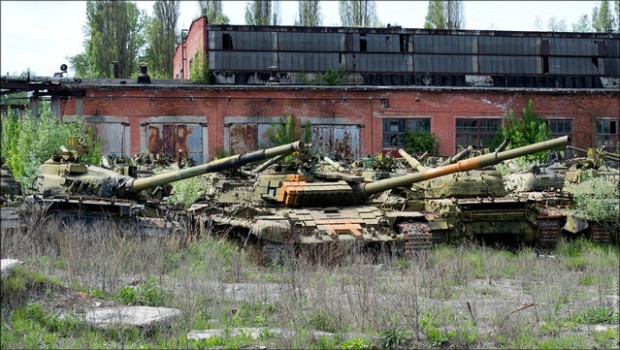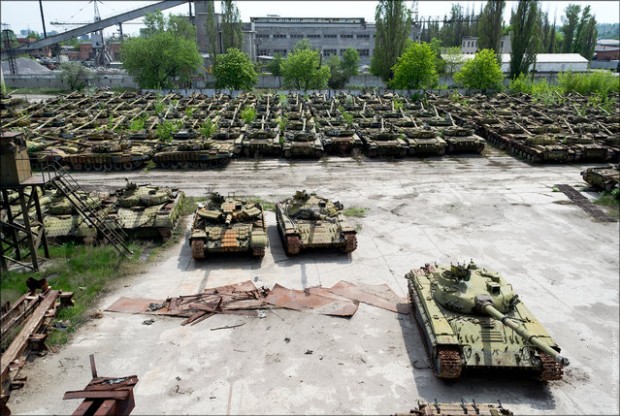This is a dispatch from Kharkiv, written before the referendum vote this past weekend. – Ed.
Kharkiv, Ukraine — Two of Ukraine’s eastern regions, Donetsk and Lugansk, are holding a referendum to establish an autonomous republic in their regions. In neighboring Kharkiv, pro-Russian separatists would like to see the same. Oleg — a young, well-educated, and eloquent professional from Kharkiv — does not fit the image of the militant pro-Russian separatists who have been clashing with the Ukrainian army in Donetsk and Lugansk. Yet, Oleg (31), who did not want his real name used for fear of ostracism at his place of employment, does not see Kharkiv’s, or eastern Ukraine’s future, as part of a united Ukraine. “To be honest,” he says, “I would like to see an autonomous South-East Republic formed.”
Recent polls show that the large majority of Ukrainians in the east and south, 75 and 84 percent respectively, want to live in a united Ukraine, either as it is today or as a federalized state. Total regional autonomy, in the form of an independent republic, is a demand of the minority and uniting with Russia is even more so.
However, with Donetsk and Lugansk holding the referendum, the balance may start to shift. If the referendum in these regions is successful, separatists in neighboring districts, like Kharkiv and Odessa, may follow suit. The prospect of such a domino effect is worrisome for the Ukrainian interim government, which has promised to pursue its military operation in the eastern regions regardless of the referendum’s outcome. Even if separatism is a minority view, it could very well become the new reality.
Pro-Russian eastern Ukrainians who support separatism, like Oleg, remain an invisible minority. News media have profiled the militant pro-Russian separatists in hot spots like Slavyansk, which is currently under a blockade, but little has been written about the motivations of “average” eastern Ukrainians who support separatism but are not partaking in militant takeovers of municipal buildings. This invisible, silent minority of eastern Ukrainians, will become increasingly important if Donetsk and Lugansk style referendums are implemented in additional regions.
“I never saw myself in Maidan,” says Oleg in a Kharkiv café just a few steps from the central square where a pro-Russian demonstration was taking place. “Maidan was an irresponsible movement…a technological project of nationalist and Western forces.” Oleg’s assertion, that the Maidan protests in Kiev were a joint “technological project” of Ukrainian nationalists and Western powers (Europe and the United States), is common among pro-Russian residents of Kharkiv. “Pro-Russian,” he says, “is a bad term. We don’t want to unite with Russia, but we want closer economic and political relations with Russia rather than Europe.” That’s because, says Oleg, the eastern regions, including Donetsk, Lugansk, Kharkiv and Dnipropetrovsk, have always been economically integrated with Russia.
In the Soviet years, Kharkiv’s factories produced cutting edge military technology. The Antonov factory was a large producer of military aircraft, but now, it mainly produces household items like kitchen stoves. Irina, a retired teacher and pro-Russian activist, says that workers at the factory routinely go without pay for months at a time. “We feel abandoned and forgotten by the government,” she says. Oleg agrees. “Since independence, the Ukrainian government has never concerned itself with our needs. There’s been no investment in our industry.”
Ukraine’s economy has gone through multiple shocks since the country’s independence in 1991. Combined with widespread political corruption, no region, east or west, has fared well. Western Ukrainian cities, like Lviv, however, have benefited from the influx of European tourists who enjoy the city’s Austrian-style cafes, cobblestone streets, and relatively low prices. Those tourists rarely come to see Kharkiv’s socialist architecture or attend productions at the city’s many theaters.
Resentment, rather than tourism, has replaced Kharkiv residents’ sense of loss.
“If the government moves in, Kharkiv residents will take up arms,” says Oleg. “We refuse to be forgotten any longer.”

